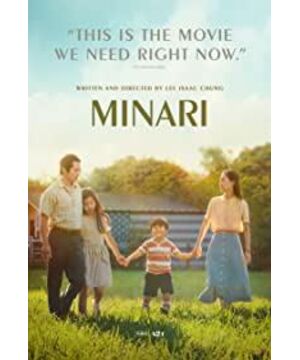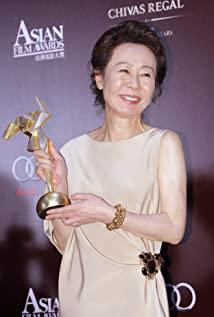A touch of sentimentality, sweet joy, and the warmth of family linger in my heart. This is the first time I watched Minari.
My grandmother is really not a mortal. She only knew from her mother that she lost her husband in the war and raised her daughter alone; but when she saw her in the United States, she was full of swear words, liked playing cards, and could not cook. , Never following the rules, she accompanied her family to church, and then secretly took back the money donated to the church...
The appearance of the grandmother brought the real beginning of the story. She brought the atmosphere of the Korean homeland, making her daughter a refuge and making her grandson uncomfortable; she brought money to support this desperate family; she accidentally burned vegetables , but planted Minari; she took away the illness of her grandson, and lost her health and spirit forever; she supported the family materially and spiritually...
She is like the water celery she planted, growing by the stream and stooping in the wind.
Apart from the mental toughness and immigrant life that most people focus on, I am more moved by the warmth of family life depicted in the film.
My grandson couldn’t run due to a heart attack. My grandmother said it’s okay, it’s okay, let’s go over there, so the grandson and grandson held hands in the field to find water celery.
The grandson was afraid of death and afraid of not seeing heaven. Grandma hugged her grandson and said, "Grandma won't let you die. Who scared my grandson like this! You don't have to see heaven...Minari, minari, wonderful, wonderful" .
The next day, my grandmother fell ill, and my grandson gradually recovered. From then on, my grandmother slept in bed, and my grandson made a floor.
After the stroke, the grandmother poured water with difficulty, not for herself, but to see that there was no water in her grandson's cup.
Grandma was mumbling in a delirious mind, subconsciously protecting her grandson from the danger of hiding.
Those moments reminded me of my grandmother, my father... Those memories of growing up, if I didn't experience them with my heart, I couldn't restore those silent cares and omnipotent protections. Those are the nostalgia of Asian directors and the memories of my life. amulet.
The film does not deliberately unfold from a single point of view, but mixes the feelings of multiple characters, with an ambitious dad, a thoughtful mom, a special grandma, and a smart and naughty little boy.
The intertwining of these perspectives gives the film a peaceful warmth and allows the viewers to choose their own perspectives. And I, prefer to choose the perspective of a little boy.
This is the hard life of an immigrant family, with setbacks, quarrels and losses along the way. The sadness of East Asian culture has not been dissipated by the arrival of the new land. The natural need to cultivate dreams and embrace nature needs to compete with the reality of being stretched every day. The hard-to-grow vegetables are burnt to the ground, but the unattended Minari is lush and green, and hope is always there. Burned and dimmed, but never faded away...
This is an ode to childhood memory planted by grandma, an experience where dreams and reality meet and flow.
View more about Minari reviews











